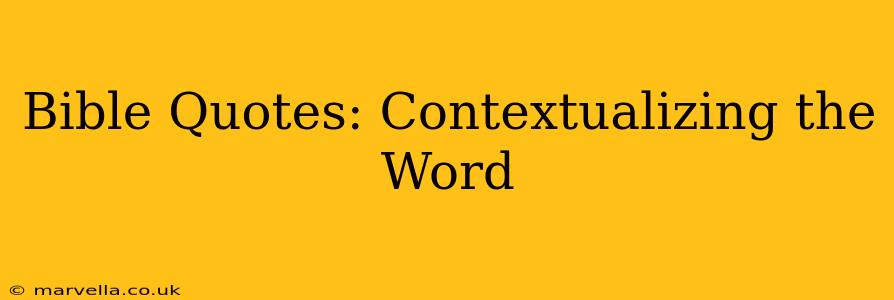The Bible, a collection of sacred texts revered by billions, offers profound wisdom, ethical guidance, and spiritual inspiration. However, extracting meaning from its verses often requires understanding the historical, cultural, and literary context surrounding each passage. Simply pulling a quote out of context can lead to misinterpretations and even distort the original intent. This article delves into the crucial importance of contextualizing Bible quotes to unlock their true significance and avoid common pitfalls.
Why is Context So Important When Understanding Bible Quotes?
Understanding the context of a Bible quote is paramount for several reasons:
-
Avoiding Misinterpretation: Taking verses out of their original setting can radically alter their meaning. A verse intended for a specific audience or situation might be inappropriately applied to a completely different scenario, leading to inaccurate conclusions.
-
Grasping the Author's Intent: Each book of the Bible was written by a specific author with a particular purpose and audience in mind. Understanding the historical context, the author's background, and the intended recipients allows us to grasp the author's message more fully.
-
Understanding Literary Devices: The Bible utilizes various literary styles, including poetry, prophecy, parable, and narrative. Recognizing these literary forms is essential to interpreting the text correctly. A metaphorical statement should not be taken literally, for example.
-
Appreciating Nuance and Complexity: Bible passages are often complex and multifaceted, containing multiple layers of meaning. Contextualization helps us appreciate the subtleties and nuances, preventing simplistic or reductionist interpretations.
What Aspects of Context Should We Consider?
To effectively contextualize a Bible quote, we must consider several key aspects:
Historical Context: When was the text written? What were the prevailing social, political, and religious conditions at the time? Understanding the historical setting illuminates the issues the author addressed and the intended impact of the message.
Literary Context: What type of literature is it (e.g., law, poetry, prophecy, gospel, letter)? How does this literary genre shape the interpretation? What are the surrounding verses and chapters saying? The immediate context often provides crucial clues to understanding a specific verse.
Cultural Context: What were the cultural norms, beliefs, and practices of the people to whom the text was addressed? Understanding the cultural background helps avoid imposing modern values or perspectives onto ancient texts.
Grammatical Context: Precisely understanding the grammar and vocabulary used in the original languages (Hebrew, Aramaic, and Greek) is crucial for accurate interpretation. Slight variations in wording can significantly impact meaning.
How Can We Effectively Contextualize Bible Quotes?
Several practical steps can help us accurately contextualize Bible quotes:
-
Read the Surrounding Verses: Don't isolate a single verse; always read the verses before and after it to understand the flow of thought.
-
Consult a Bible Commentary: Reputable commentaries offer valuable insights into the historical, cultural, and literary context of specific passages.
-
Study Bible Dictionaries and Encyclopedias: These resources provide background information on people, places, events, and terms mentioned in the Bible.
-
Consider Different Interpretations: Be open to various interpretations, acknowledging that some passages may have multiple valid meanings.
-
Pray for Guidance: Seek God's guidance through prayer as you study and interpret Scripture.
Frequently Asked Questions (FAQ)
How do I know if a Bible quote is being used out of context?
A Bible quote is likely out of context if it doesn't align with the surrounding verses or the overall message of the book in which it appears. If the meaning seems drastically different from the context, it's a strong indication of misapplication.
Are there specific Bible verses often misused?
Yes, several verses are frequently taken out of context. Examples include verses on prosperity, judgment, or specific commandments. It's crucial to research these thoroughly to ensure accurate understanding.
Where can I find reliable resources for Bible study?
Many resources are available, including reputable commentaries, Bible dictionaries, encyclopedias, and scholarly articles. Your local library or seminary may also offer helpful resources.
By diligently applying these principles, we can unlock the rich tapestry of meaning embedded within the Bible and avoid the pitfalls of misinterpretation. Contextualizing Bible quotes is not merely an academic exercise; it's a vital step in engaging with Scripture thoughtfully, responsibly, and ultimately, more profoundly.

